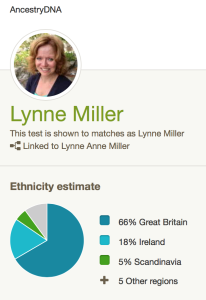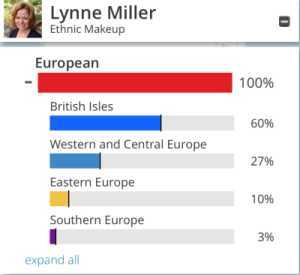Ethnic identity is complicated if you are adopted.
As a late discovery adoptee, I thought for most of my life that I was a mix of Polish and German ancestry. After I found out I was adopted, I learned my biological ancestors were primarily Irish. Then on St. Patrick’s Day, I discovered I may not be all that Irish after all.
As I checked my email on the subway last week, I saw the message from Ancestry. “Your Ancestry DNA results are in!” Excited, I opened the message, and clicked on the analysis of my ethnic makeup. Much to my surprise, Ancestry estimates my Irish-ness to be merely 18 percent. About two-thirds of my ancestry can be traced back to England, Scotland and Wales.

Ethnic Origins Can be Misleading for Adoptees
A while ago, I wrote about discovering and embracing my Irish roots. Discovering you have a different ethnic identity is a common phenomenon for late discovery adoptees. We grow up believing what our parents tell us and find out, as adults, that the truth is something entirely different.
My Polish-German identity started to crumble once I learned, at age 38, that I was adopted. Still, I didn’t abandon the Polish and German identity until a DNA test made it official.

I also confirmed my heritage, or so I thought, with blood relatives. My biological sister, Michelle, told me our mother, Lillian was Irish. A cousin who is a genealogist suggested our family’s oldest known ancestor was an indentured servant from Ireland who immigrated to Maryland in the 1700s. I had to be at least 50 percent Irish.
Of course, not knowing anything about my father and his relatives leaves a big hole in my story.
Also, the science of determining ethnic origins is evolving. DNA test companies only provide estimates of ethnicity. I can’t take those percentages too seriously. Besides, being English, Scottish and Welsh isn’t all that different from being Irish, right?
Have you heard conflicting things about your roots? I’d love to hear your stories.

“Besides, being English, Scottish and Welsh isn’t all that different from being Irish, right?” Oooh, you be careful who you say that to, lassie. There is not a lot of love for the English amongst those other groups.
I was told I was mostly German. DNA testing finds *no German*. This could mean a lot of things. Not sure what the truth is, and won’t know unless or until some close relatives also do DNA tests. And since they aren’t speaking to me, that’s not going to happen any time soon. It’s never dull, is it.
Ah, you’re so right, Elle. They may be neighbors but that doesn’t mean those groups get along like one big happy family. It’s too bad your relatives are giving you a hard time. Sorry about that. What is the ethnic story behind Cuardaigh? Is it your husband’s name?
Hi Lynne,
yes, it’s me – we are FB friends as well as on many boards together …
Just a suggestion … and beware – gedmatch is addicting …
now that you have this – download to gedmatch.com
It’s free – just create an account – sign in and it will walk you through the porcess to download your Ancestry raw data
the benefit here is that you can have access to those that haven’t used ancestry dna [ftdna, 23andme] and the other thing is that on gedmatch you can see where you share genomes and possibly trace back to how you are related through a common ancestor that you share with someone on the same genome – it takes work – but is worth it when you are looking!!
there’s more to discuss – but take the next step… you will be happy you did 🙂
Feel free to email me directly ….
best
Francine
fellow adoptee in search of my truth & my original tribe ….
Despite having non-ID information on my genetics (sort of), I was raised as though I was 100% Irish-American, as that’s how my a-mom described “our family.” Today is THE HOLIDAY for her. And weirdly, I sort of believed all of that. What else did I have to go on? I had no model for how to identify with anything BUT Irish-American.
Between DNA testing from 23andMe and a lot of time spent on Ancestry.com, I’ve learned so so so very much. First off, I am not Irish-American, not really at all. I’m mostly Asian with a bit of Eastern European blood. There’s a tiny bit from some part of the UK, probably, but it’s tiny. I am still adjusting to this.
Secondly? My a-parents are only a bit Irish-American. My a-dad’s mom was French! We never talked about this or heard about this (and she was gone before we were adopted). Family ethnic identity, even within intact bio-families is more of a story than a science, and that is making finding my story less alienating and more of a journey. (Most of the time.)
Hi Yan. Do you find it comforting or grounding to know what your ethnic identity is? I’m sure it is quite a mental adjustment for you. I’ll bet many people would discover surprising things about their ethnic backgrounds if they did DNA testing. As you said, much of what we think we know about our heritage is based more on stories than science.
Hi Francine. Nice to see a friend on my blog! Thanks for reminding me about Gedmatch. I uploaded my FTDNA results on Gedmatch but not Ancestry’s. I recall it took some effort to upload the data but once I got on, I discovered new people. I’m sure there are even more newcomers – I haven’t been on Gedmatch in some time.
How is your search going?
My husband’s name? Ha. No. Cuardaigh is Irish and means “searches” or “to search”. I chose that as my pen name. Elle (“she”) Cuardaigh (“searches”). It was part of reclaiming that part of my ethnic background.
Elle, that’s very interesting. What’s your real name?